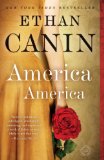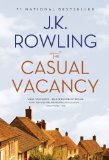Summary | Excerpt | Reading Guide | Reviews | Beyond the book | Read-Alikes | Genres & Themes | Author Bio

A Novel
by Ethan CaninAmerica America is a great read but a worrisome think, if
I may coin a phrase. Ethan Canin writes in the storytelling tradition of Richard
Russo: a slow, detailed, fully realized, and gratifying portrait of small-town
America. Yet his uncritical, almost adoring tale of wealth and power
bothered me, and I wondered why this novel is being promoted so heavily at this
moment in time.
The novel is masterfully plotted. Canin takes a linear story—the rise and
fall of a powerful family—and twists it into a mobius strip. He immerses his
reader in the past, but then continually interrupts that immersion, returning to the
present moment of narration in order to give a retrospective
viewpoint. This allows him to draw out a familiar story, making the reader feel
like an insider because of how much she knows without being told. It also allows
him to fold two different moments into one, like shuffling a deck of cards. In
this passage, young Corey is simultaneously in an airplane flown by Mrs. Metarey
and back at home narrating the experience to his mother:
And then we were through, out into the sun that lit a sea of white to
the horizon. I have to admit I think I shouted.
"Oh, no," said my mother. "What did you shout?"
"I don't know. 'Wow,' or something."
Mrs. Metarey turned and smiled. She made a whoop.
"Women's lib," said my mother.
The novel is filled with such graceful moments. Then periodically Corey
Sifter steps out of the narration altogether, and the story is moved forward by
a primary document interlaced without comment, such as an autopsy report or a
newspaper article. Canin has full command of the unscrolling of his story.
Where the novel falls short, however, is in the delineation of its characters.
With his narrator and protagonist, Canin has written himself into a bind. On the
one hand, Corey Sifter must be Everyman, an ordinary boy who gives us a window
into the inner workings of an extraordinary, privileged family. On the other
hand, Corey must himself be extraordinary in order to justify his inclusion in
the family and his presence at nearly every important moment in their lives. Too
often, Canin resorts to ham-handed ways of conveying character. One of the
Metarey daughters is made to repeat on three separate occasions, "Corey Sifter,
you are different from the rest," despite the fact that Corey is never
more than blandly deferential in his interactions with the great and mercurial
family.
Yet character is the very key to the novel's understanding of American politics.
Canin writes,
"For a man on the rise in politics, power first comes through character—that combination of station and forcefulness that produces not just intimidation, which is power's crudest form, but flattery, too, which is one of its most refined. After that, power begins to grow from its own essence, rising no longer exclusively from the man but from the office itself."
Note his use of the word "station," a word whose frequency in the novel is
only matched by the word "rank." Certainly Canin understands and dramatizes the
social mobility that distinguishes America from more class-bound societies. The
Metarey fortune was founded by Eeoghan, a dirt-poor Scottish immigrant who rode
the Industrial Revolution with remorseless savvy. His son, Liam, strives to
compensate for Eeoghan's cruelty toward his workers by administering his
inheritance with liberal benevolence, yet as Corey says mournfully, "[the]
family produced the great patriarch, and now with each generation…we regress
closer to the mean." As the Metareys decline, Corey moves up in the world, and
his story is the story of "any kid whose ambition takes him beyond his rank."
Yet for all that he profits from the fluidity of class in America, Corey—and
hence Canin—is discomfortingly nostalgic for a past that never was, a time when
station helped determine character and old money produced gentlemanly heroes.
Corey never modulates his admiration for Liam's charisma and noblesse oblige,
even when he witnesses events that should cause him to question the toll on
integrity that power exacts.
A book called America America loudly signals its ambition and its
symbolism. Other reviewers hold it up to Theodore Dreiser's An American
Tragedy, F. Scott Fitzgerald's The Great Gatsby, and Robert Penn
Warren's All the King's Men. But I must be suspicious of an American
fable which features only white people, a book which aims to represent American
identity but which encompasses none of the contestations that have gone into the
making of the nation. In the end, I'm left with a question whose answer I
suspect is unpleasant: why is this book being touted at a time of widespread
criticism over the growing gap between the rich and the poor in America? What
cultural work does this re-imagining of recent American history perform?
![]() This review was originally published in The BookBrowse Review in August 2008, and has been updated for the
May 2009 edition.
Click here to go to this issue.
This review was originally published in The BookBrowse Review in August 2008, and has been updated for the
May 2009 edition.
Click here to go to this issue.

If you liked America America, try these:

by Liza Klaussmann
Published 2016
A dazzling novel set in the French Riviera based on the real-life inspirations for F. Scott Fitzgerald's Tender is The Night.

by J.K. (Joanne) Rowling
Published 2013
Blackly comic, thought-provoking and constantly surprising, The Casual Vacancy is J.K. Rowling's first novel for adults.
Your guide toexceptional books
BookBrowse seeks out and recommends the best in contemporary fiction and nonfiction—books that not only engage and entertain but also deepen our understanding of ourselves and the world around us.